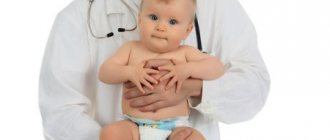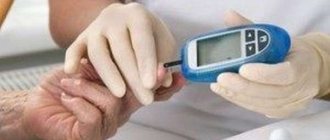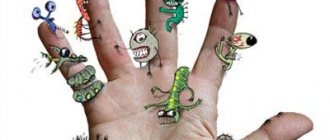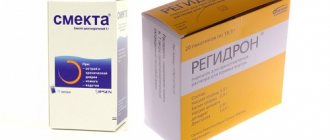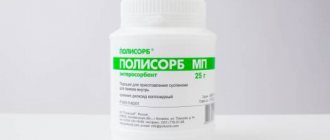Food poisoning is a pathology that can occur in people of different age groups. A common accompanying symptom signaling an intestinal disorder is diarrhea. The main task in case of food poisoning is to avoid dehydration and intoxication of the body. Proper nutrition and medication are the main methods of treatment.
What can be considered diarrhea?
Before deciding whether diarrhea medications are truly necessary, it is important to understand what constitutes abnormal bowel movements.
Normally, in an adult, stool is brown in color, has a specific smell and has a shaped shape. Defecation can occur 1–3 times a day. Some people have bowel movements more often, some less often.
If going to the toilet is accompanied by severe pain, cramps, stool is watery and has a strong unpleasant odor, you may need help. Having bowel movements more than 5 to 10 times is called acute diarrhea.
If your stool contains mucus or blood, it is important to immediately seek professional help. In other cases, food poisoning can be successfully treated at home.
Possible consequences
Diarrhea may continue for several days. In severe cases, a week. Diarrhea leads to dangerous changes:
- fluid loss;
- release of electrolytes and chlorides;
- deficiency of potassium and calcium ions, which leads to disruption of the heart;
- increasing blood viscosity and thickening;
- development of blood clots;
- convulsions;
- metabolic acidosis.
Additionally, with diarrhea, normal microflora leaves the intestines. This can cause the development of dysbiosis. With severe dehydration, the heart, kidneys, and nervous system suffer.
Symptoms of the condition
What to drink if poisoned can be decided based on the symptoms that appear. The sooner adequate treatment is applied, the fewer toxic compounds will enter the bloodstream and the patient will feel better.
The main symptoms of food poisoning include the following:
- frequent loose stools;
- general weakness and lethargy;
- temperature;
- nausea and vomiting;
- dizziness.
How many days does a serious condition usually last? In both children and adults, most unpleasant symptoms disappear completely within 3 days.
When food poisoning occurs, the intensity of symptoms may vary from person to person. Not the least important role is played by the general condition of the body before poisoning, immunity and the type of product that caused the poisoning.
When food poisoning is accompanied by diarrhea, severe vomiting, darkening of the eyes, low blood pressure, and home remedies do not provide relief, it may be better to call an ambulance. Severe diarrhea can be dangerous.
We recommend: Causes of diarrhea after milk and what to do about it?
Folk recipes
If diarrhea occurs due to poisoning, normal digestion can be restored by supplementing drug therapy with traditional methods of treatment. Since drinking a large volume of water is required to avoid dehydration, it is better to replace ordinary boiled water with herbal teas that help eliminate the urge to vomit and stop diarrhea.
Patients with poisoning can drink:
- Mint tea . It calms and eliminates nausea.
- Chamomile infusion . Helps restore digestion, helps eliminate inflammation of the mucous membrane.
- Lemon balm decoction . It has a calming effect and helps restore the water-salt balance in the body.
Starch is suitable for treating diarrhea caused by poisoning. For an adult, it is enough to eat a heaping tablespoon of dry starch and wash it down with water. This product gently envelops the mucous membrane, helps to consolidate stool, and slow down the movement of the food bolus through the intestines. Also, to get rid of diarrhea, you can eat strengthening foods: rice porridge, baked apples.
It is important for patients to avoid drinking alcohol and any products that can irritate the gastrointestinal mucosa. In order for loose stools in case of poisoning to be cured as soon as possible, it is necessary to follow a gentle diet for at least a week.
Reasons for the development of poisoning
Treatment will directly depend on the reasons that caused the unpleasant condition. In case of poisoning and diarrhea, assistance measures must be quick, clear and correct. Not everything depends only on the pills you take.
There can be many toxic factors. Most often, assistance must be provided due to poisoning:
- mushrooms;
- mercury;
- alcohol;
- paint.
If a person is poisoned, this can also be caused by uncontrolled use of pills or even the most ordinary foods. A poisoned person might not even think about how great the impact of expired food is, or how important it is to quickly put cooked dishes in the refrigerator. This rule especially applies to meat and dressed salads.
All vegetables and fruits can also cause food poisoning. To avoid this, you need to wash them thoroughly after purchasing, and pour boiling water over the greens. Since plant food is located close to the ground during the ripening process, it can become a source of infection by various helminths.
Poisoning and subsequent intoxication can be caused by improperly prepared meat and fish. Pathogenic microorganisms die only with complete heat treatment. Therefore, there is always a high risk of being poisoned by undercooked meat products or sushi.
What to look for?
Inedible or poisonous mushrooms can cause very severe poisoning. You should never try mushrooms raw or collect unknown or questionable types of product. The same rule applies to wild berries. Some can be poisonous, causing severe poisoning.
Symptoms of mushroom poisoning are usually pronounced, and in addition to the usual symptoms, hallucinations may appear. In this case, you should call an emergency ambulance and get medical advice.
What to do if poisoning occurs due to mercury entering the body? First aid for the victim is the same as for ordinary food poisoning. Before you start taking any medication, it is important to consult with your doctor.
In case of alcohol poisoning, it is also better to seek help from a hospital. Some types of alcohol toxins can cause death in large quantities. Timely medical assistance can save a person’s life and maintain health.
In case of paint poisoning, a person should be taken out into fresh air, given plenty of fluids and, if necessary, call an ambulance and get advice on what to do in such a situation.
We recommend: Features of treatment and risks of diarrhea with hemorrhoids
The same remedy for poisoning and diarrhea may be effective for treating one person and completely unsuitable for another. How to treat diarrhea after poisoning, taking into account the reasons that caused the condition? It is important to understand what first aid is needed for a person affected by toxic substances.
Prevention
The first rule that is recommended to be observed is personal hygiene. Wash your hands thoroughly before eating, immediately upon returning from the street. Large crowds of people always have a lot of harmful bacteria. After visiting such places, wash your hands with soap or antiseptic gel.
Before cooking, food should be washed with warm water. Vegetables and fruits should be doused with boiling water to remove all invisible contaminants. Meat and fish require a long cooking time. Then existing infections and bacteria will die.
Food storage rules must be followed. Cooked food should not be stored in the refrigerator for longer than two days. It is forbidden to eat raw eggs.
It is not recommended to eat expired products. Berries and mushrooms cannot be collected near the roadway. You need to buy only quality products from the store.
Medicines must be taken as prescribed by a doctor. You should also check the expiration date.
Take alcohol in small quantities. Excessive consumption causes acute intoxication of the body.
Control your salt intake. It contains impurities that provoke poisoning with an attack of diarrhea.
Every person has encountered an intestinal disorder at least once in their life. Unpleasant condition, headache, nausea and vomiting are just some of the symptoms of food poisoning. Diarrhea due to poisoning also happens very often. What to do in such a situation? Which drugs should you take and which should you avoid? How to correctly provide first aid? What to do if a child develops diarrhea due to poisoning? How can such a condition be dangerous?
Related article - The most likely source of infection for influenza is
First aid for diarrhea
Regardless of whether you had to treat an intestinal disorder without fever, or the patient also has this symptom, first aid is always the same. It consists of several stages:
- Stomach cleansing.
- Restoring water balance.
- Purgation.
- Diet.
Although medications for poisoning can significantly improve a person’s well-being, proper assistance to the body will promote a speedy recovery and help avoid the development of complications.
How to cleanse your stomach?
The human body is a unique structure. It is capable of cleaning itself when some low-quality product enters the digestive tract. When a person eats something inappropriate, nausea usually sets in. But this may not be enough to fully cleanse the stomach.
Although the body gets rid of a significant amount of toxic substances with the first vomiting, this does not provide complete relief. Therefore, a person should immediately try to drink up to half a liter of clean, warm water. You can add a granule of potassium permanganate or soda to it on the tip of a knife. Abrupt consumption of such a volume of liquid will provoke repeated vomiting, which will help the body get rid of toxic compounds remaining in the stomach.
Although a single gastric lavage has a positive effect, it is advisable to repeat this manipulation several times. You should continue until clean water comes out of the stomach. If the urge to vomit has stopped, the procedure should also be stopped.
How to restore fluid volume in the body?
The greatest danger to human life with intestinal disorders of any etiology is dehydration. Water leaves the body along with toxic compounds. It is important to replenish its volume correctly.
To maintain a normal balance, experts recommend drinking small sips of water after each attack of diarrhea or vomiting. For rehydration we recommend:
- saline solutions;
- glucose-salt compositions;
- boiled water;
- mineral water.
Milk, sweet drinks, tea or coffee are not suitable for these purposes.
How to cleanse the intestines?
In addition to cleansing the intestines naturally, special preparations are taken - sorbents. In addition, it is important to stop using medications that stop diarrhea. It is important to understand that diarrhea is a natural protective reaction of the body to the penetration of pathogenic microorganisms or toxic substances. If you stop diarrhea immediately, harmful compounds will remain inside the body, which will continue to poison the person, and the treatment will take longer and more difficult.
We recommend: Is it possible to do an enema if you have diarrhea?
The table below describes the main sorbent drugs that are taken for food poisoning.
| A drug | Features of application |
| Activated carbon | The medicine is taken at the rate of 1 tablet per 10 kg of weight. The drug is not suitable for people suffering from peptic ulcers. Can be taken only after cleansing the stomach. After the first dose, use of the medicine can be continued every few hours, 2-3 tablets. The drug removes toxins and normalizes intestinal motility. |
| Smecta | Effective sorbent. Available in powder form. The composition is diluted in warm clean water and drunk. The drug coats the intestinal walls, helping to relieve irritation. Diarrhea gradually weakens and pain decreases. It is not advisable to use at temperatures. |
| Atoxyl | The drug binds toxic compounds and carefully removes them out. It is effective not only for diarrhea, but also for nausea and vomiting. Medical practice proves that in 90% of cases, 15–20 minutes after using the medicine, nausea and vomiting disappear, and the frequency of bowel movements decreases. Repeated use of the product is most often not required. Can be used even at high temperatures. |
| Enterosgel | Perfectly coats the walls of the stomach and intestines, relieves irritation, and restores digestive processes. Available in the form of a suspension. Do not use for intestinal atony. |
Now it is much clearer what to do if a person is poisoned. Treatment will be more effective if you strictly adhere to the diet.
Therapeutic diet
If we are not talking about treating a small child, you can arrange a day of fasting. What do they eat during this period? Pure drinking water, herbal teas and infusions are acceptable. In the first hours of acute diarrhea, it is better to avoid other foods.
What to eat after the acute phase has passed? You can gradually introduce lactic acid products, low-fat cottage cheese and kefir. Banana is allowed as a fruit. You can prepare low-fat broth and crackers. We also recommend that you read: what can you eat if you have diarrhea?
If you eat right during diarrhea, the symptoms of the disease will quickly subside. You can use drugs like Loperamide or Levomycetin only as a last resort, and then only after consulting a doctor.
Treatment
Treatment for diarrhea consists of first aid, drug therapy and a prescribed diet. Pathology must be treated in a short time. For children, this condition is especially dangerous. Lack of water and microelements will provoke the development of serious consequences. An adult experiences complications in case of intoxication and sometimes without poisoning. This is sometimes caused by diseases of other organs.
First aid
Without the symptoms accompanying diarrhea - high body temperature, delirium and hallucinations, suffocation - first aid is the same. You should call an ambulance or go to the hospital yourself.
At home, first of all:
- The patient needs to be given a lot of water;
- You should not eat until medical assistance is provided;
- Remove toxins from the body;
- Fresh air and peace are needed.
If the patient is unconscious, gastric lavage cannot be done. Stopping diarrhea during intoxication is not recommended. Temperature up to 37.5 degrees cannot be brought down. Before the ambulance arrives, you should not offer pills to relieve abdominal pain, even if the pain is severe. It is forbidden to do an enema at high temperatures.
Drug therapy
Only a doctor can completely cure a patient. Drug treatment is prescribed in accordance with physiological characteristics and medical indications. Medicines can stop the progression of the painful symptom. The dosage and timing of administration will be determined by the doctor.
Drug therapy consists of taking:
- Sorbents - remove poison from the body, relieve signs of bloating. Use Activated Carbon, White Coal, Polysorb, Smecta, etc.
- Rehydrona – restores water-salt balance.
- Probiotics – normalize the microflora of the gastrointestinal tract. They use Hilak-Forte, Linex, etc.
- Using droppers, saline solution is administered to get rid of vomiting and relieve the consequences of severe intoxication.
- Drugs that relieve pain spasms.
- Necessary vitamin complexes.
- Antiviral and antibacterial agents - in the presence of microbial infection.
When a person is poisoned, Imodium and Loperamide are prescribed with caution. These drugs stop intestinal motility and slow down the movement of feces, which inhibits the elimination of toxins. The patient's condition may deteriorate sharply.
Treatment with folk remedies is recommended to be coordinated with your doctor. The effectiveness of medicines and infusions from traditional medicine can only be assessed by a doctor. If this helps restore the balance of chloride and electrolyte in the body, then you need to use herbal remedies.
Diet
If diarrhea lasts more than five days or a week, essential microelements and vitamins are lost. At this time, acute dehydration occurs. The patient will be prescribed a diet to replenish microelements. The first day you will have to fast. You will need to drink a lot of water at the same time. On the second day, it is permissible to eat yesterday’s bread or crackers, rice and oatmeal cooked in water. Rice water removes toxins well; it is recommended to drink it in the first days after intoxication.
Viral and bacterial infections
The appearance of incessant vomiting and diarrhea with fever in a person always gives reason to suspect infection with viruses and bacteria. The diseases are severe. Timely laboratory testing (blood, feces, urine, vomit) can identify the pathogen. Afterwards, adequate therapy is selected.
Common viral and bacterial infections:
- Rotavirus.
- Dysentery.
- Salmonellosis.
- Viral hepatitis.
Viral type hepatitis
Rotaviruses
Rotavirus (intestinal flu) is a microorganism that affects the human intestines. They are infected by the fecal-oral route. Not related to the influenza virus. The disease began to be called that because of the similarity of symptoms (temperature 37-38, runny nose, cough, headache, sore throat, vomiting, diarrhea, weakness).
When to call a doctor
It never hurts to see a doctor, but in certain conditions it is not only possible, but also extremely necessary. Reasons to call an ambulance or doctor to your home:
- detection of symptoms of dehydration: dry skin, rare urination, dark urine, extreme thirst, pallor, discomfort in the heart area;
- diarrhea with blood or vomiting with blood;
- fever or temperature of 37, which has lasted for several days.
As a rule, upon arrival of emergency care, the patient is sent to the hospital to undergo tests and find out the causes of the disease.
Disorders from the digestive system can be alarm bells for many diseases , so if they do not stop and periodically return, this is hardly a banal food poisoning. With such signs, the patient must be provided with rest, given enterosorbent and constantly drink water. To speed up recovery, you can turn to folk remedies, but only a doctor can prescribe the correct treatment after determining the causes of these symptoms.
Anyone can be poisoned by poor quality food. But is there a fever during poisoning? This question often arises among people who have had to deal with severe intoxication. An increase in temperature after poisoning is a natural physiological reaction of the body to the entry of toxins, bacteria or viruses into the bloodstream.
Hyperthermia (in simple terms, elevated temperature) is considered a good sign that indicates the ability of the poisoned patient’s immune system to fight pathogenic agents. However, in case of poisoning, the temperature can reach high values, threatening the life of the patient. Therefore, it is worth understanding why hyperthermia develops and what its consequences are.
